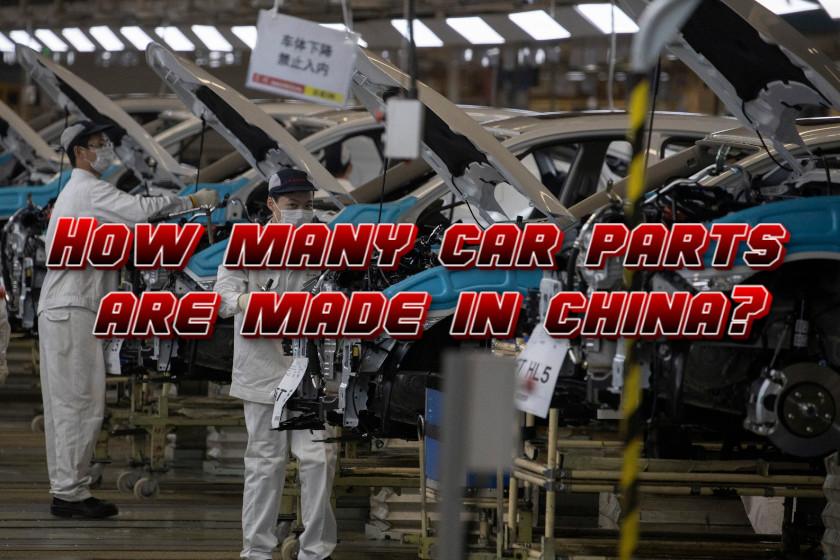
In the ever-evolving landscape of the automotive industry, the origin of car parts has become a topic of significant interest. As we explore the globalized nature of manufacturing, one question stands out: How many car parts are made in China? In this article, we will delve into the intricacies of the automotive supply chain, examining the prevalence and impact of Chinese manufacturing in the production of car components.
The Global Automotive Supply Chain
The automotive industry is a vast network of interconnected suppliers, manufacturers, and distributors spanning the globe. In recent decades, China has emerged as a major player in this complex ecosystem, becoming a central hub for the production of various car parts. The reasons behind this shift are multifaceted, including cost-efficiency, technological advancements, and the country's strategic position as the world's manufacturing powerhouse.
The Rise of China in Auto Parts Manufacturing
China's ascent in the automotive supply chain has been remarkable. Initially recognized for producing low-cost, low-quality components, the country has undergone a transformation, now manufacturing a wide array of high-quality car parts. From electronics and sensors to engines and transmissions, Chinese manufacturers have significantly expanded their capabilities and product offerings.
Key Car Parts Produced in China
Electronics and Electrical Components
China has become a major producer of automotive electronics, including sensors, control units, and infotainment systems. The country's expertise in electronics manufacturing has positioned it as a key contributor to the technological advancements in modern vehicles.
Engines and Transmissions
Engine and transmission production is another sector where China has made significant strides. Many global automakers source engines and transmissions or their components from Chinese manufacturers due to cost competitiveness and quality improvements.
Brake Systems and Components
China's prowess extends to the production of brake systems, including brake pads, calipers, and rotors. This sector has witnessed substantial growth, with Chinese manufacturers meeting international standards in terms of safety and performance.
Plastic and Rubber Components
Various plastic and rubber components, such as bumpers, seals, and interior trim, are commonly produced in China. The country's manufacturing capabilities in molding and shaping these materials have contributed to their widespread use in the automotive industry.
Suspension and Steering Parts
China is a key player in the production of suspension and steering components. From shock absorbers to tie rods, Chinese manufacturers have gained recognition for their ability to produce reliable and cost-effective parts.
Factors Driving the Shift to Chinese Manufacturing
Cost Efficiency
The primary driver behind the increasing reliance on Chinese-made car parts is cost efficiency. The competitive pricing of Chinese components allows automakers to reduce production costs and offer more affordable vehicles to consumers.
Technological Advancements
China's commitment to technological innovation has played a crucial role in its automotive industry. The country has invested heavily in research and development, resulting in the production of advanced and technologically sophisticated car parts.
Quality Improvements
While there were initial concerns about the quality of Chinese-made automotive components, manufacturers have responded by implementing stringent quality control measures. Many Chinese companies now adhere to international quality standards, ensuring the reliability and durability of their products.
Strategic Global Partnerships
Chinese manufacturers have established strategic partnerships with global automakers. This collaboration allows for the seamless integration of Chinese-made components into vehicles produced by well-known brands, contributing to the globalization of the automotive supply chain.
Challenges and Considerations
While China's role in automotive manufacturing has grown significantly, challenges persist. Quality control remains a focal point, and some skeptics question the longevity and reliability of Chinese-made components. Additionally, the geopolitical landscape and trade tensions can impact the flow of automotive parts globally, prompting manufacturers to reassess their supply chain strategies.
The Future Landscape
As the automotive industry continues to evolve, the role of China in supplying car parts is expected to expand further. The country's focus on electric and autonomous vehicles, coupled with ongoing technological advancements, positions China as a driving force in shaping the future of automotive manufacturing.
Final Words
In the dynamic world of automotive manufacturing, China has emerged as a powerhouse in the production of car parts. From electronic components to engines and beyond, Chinese manufacturers play a crucial role in the global supply chain. As the industry embraces innovation and sustainability, China's influence is likely to grow, shaping the vehicles we drive and the technologies that propel them into the future. The era of Chinese-made car parts is not just a trend; it's a transformative force steering the automotive industry towards new horizons.
